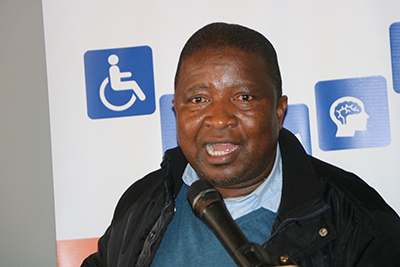By Thoboloko Ntšonyane
MOHALE’S HOEK – Despite various initiatives and interventions aimed at addressing the plight of the people with disabilities (PWDs) in Lesotho, the situation regarding their needs remains unsettled/ling.
Their full participation in sports and in society remains a challenge due to significant challenges with access to accommodating infrastructures and facilities. Few population of the PWDs have made it despite this persistent challenges.
The Lesotho Federation of Organizations of the Disabled (LNFOD)’s Projects Coordinator Rabasotho Moeletsi believes that PWD require facilities and attitudes that are more welcoming and respond to their different impairments.
He argues that the societal norms and attitudes towards disability still continue to happen and thus pose problem for their community to have full participation in all spheres of life.
He advocates for inclusive societies and comprehensive polices that values and supports the rights of the PWDs.
At LNFOD, Moeletsi said “we see disability more than a medical problem; we are not sick; we just have impairments”.
Disability he said is a result of interaction between the individuals with impairments and the attitudinal and environmental barriers adding that it is an “evolving concept”.
“Disability is caused by a society; it is the function of the society. That means if a society behaves in a certain way, disability in that community will increase because the size of the barriers would have increased,” he charged.
He said if a society is inclusive enough “the disability that we have will be decreased”.
While there are efforts to address the needs and plight of the PWDs in Lesotho, the challenges as the disability community still wait with abated breath,
The country launched the National Disability Mainstreaming Plan as a response towards the implementation of the United Nations Convention on the Rights of Persons with Disabilities.
Moeletsi continued: “Disability equals to impairment which is constant, multiplied by the barriers. That means for you to lower disability, you need to lower the barriers.”
According to the UN, “persons with disabilities include those who have long-term physical, mental, intellectual or sensory impairments which in interaction with various barriers may hinder their full and effective participation in society on an equal basis with others”.
Lesotho laws including the constitution prohibit discrimination against the PWDs, be that as it may, the government has been criticized for not making it easier for PWDs to enjoy education, equal access to job opportunities. There are still some buildings that are not inclusive enough to accommodate PWDs.
In effort to take care of their welfare, the government has introduced the social security wherein those with “severe disabilities” earn M600.00 per month from April 1, an increase from M400.00, but owing to ever increasing inflation rate, this money can only afford a few items.
LNFOD’s Project Coordinator said “impairment is constant, you don’t have to cure me”.
“My impairment, if I don’t have a leg, I don’t have a leg. I am still the same as you. It’s just that my movement is not the same as yours, it’s different. But we are going to reach the same destination.
“So all you can do to help me, is clear the way, clear the barriers, then there will be no disability,” he said urging the society to be part of the “solution and not part of the problem”.
He said concerted efforts should be made to ensure that PWDs are included within the society.
Meanwhile, LNFOD has recently hailed the Chief Justice for making rules that will promote access to justice for PWDs in the judicial proceedings.
These rules are contained in the Disability Equity (Procedure) Rules, 2023 and were published in the gazette No.39 on May 26, 2023.
“Yet another gain for the disability sector! The Lesotho Federation of Organizations of the Disabled (LNFOD) celebrates the Chief Justice of Lesotho for making the Rules to promote access to justice for persons with disabilities in the judicial proceedings or processes.
“Through the support of the Open Society initiative of Southern Africa (OSISA), LNFOD sought to strengthen access to justice for persons with disabilities by supporting the Chief Justice of Lesotho to develop and put in place the access justice rules in accordance with the disability law.
“The rules will apply in pre-trial, trial and post-trial processes with the purpose of facilitating effective participation through procedural and age-appropriate accommodations. Most importantly the Rules will guide judicial officers, legal practitioners, court officials and other participants in judicial proceedings or process on how to accommodate and support person with disabilities to ensure their full and effective participation on equal basis with other, in all interactions with such judicial proceedings,” reads LNFOD statement in pertinent part.


